windfarm-IMG_0079-900-web
Do you have any thoughts on this post?
This summit is only the beginning of a broad and critical conversation that we intend to continue
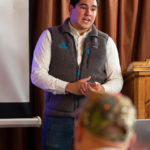 In early October 2019, the TRCP partnered with Hispanic Access Foundation and Nuestra Tierra Conservation Project to host a Hispanic Sportsmen and Women’s Summit in Taos, New Mexico.
In early October 2019, the TRCP partnered with Hispanic Access Foundation and Nuestra Tierra Conservation Project to host a Hispanic Sportsmen and Women’s Summit in Taos, New Mexico.
The summit kicked off with space for each attendee to share a personal item and story that connects them to hunting, fishing, and conservation. Among the items were fly boxes, reels, backpacks, feathers, elk ivories, hats, and photos. The personal stories that accompanied each item emphasized the lessons learned while overcoming challenges and the power of public lands and waterways. Some of the stories also focused on the important role of mentorship in hunting and conservation and the critical need for experienced hunters and anglers to share their expertise.
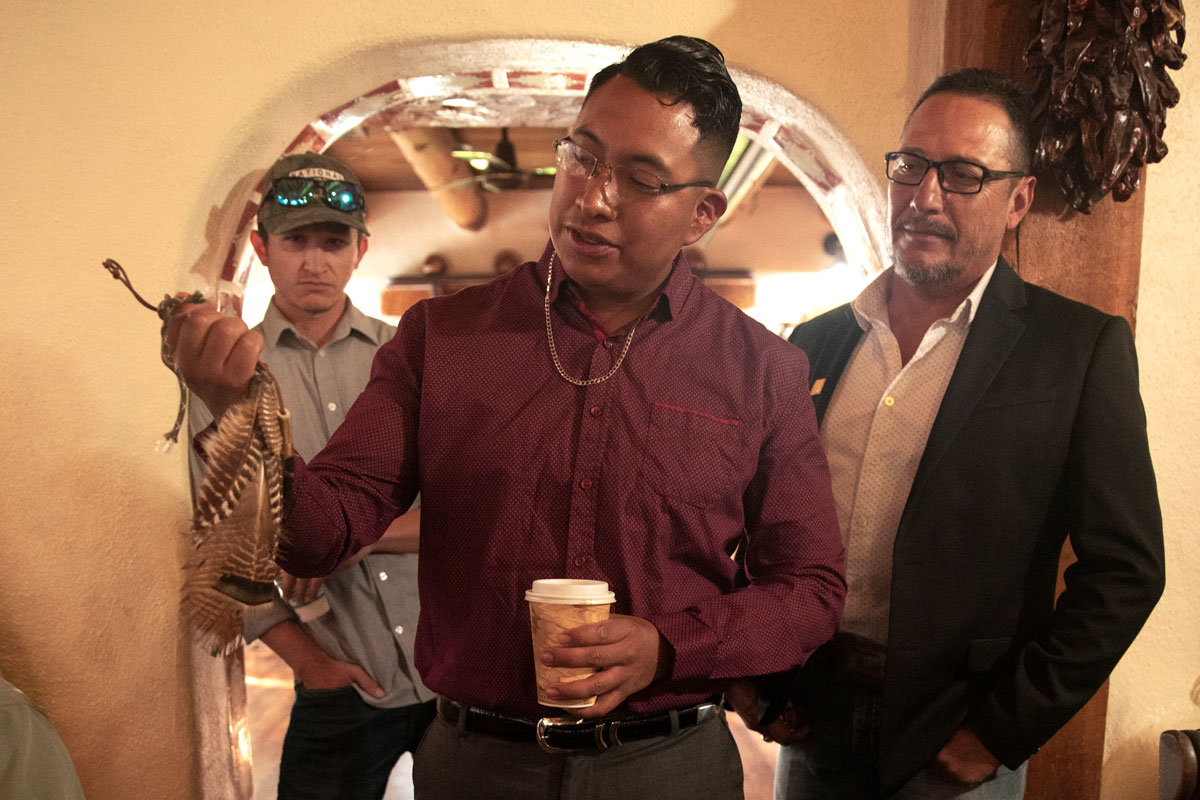
Organizations were given time to share presentations and highlight how we can work together to advance mutual interests. While we share similar conservation goals, the summit also provided an outlet to discuss how mainstream conservation groups could facilitate and foster diversity and broaden authentic outreach to underrepresented sportsmen and women communities. By recognizing and addressing barriers of access, we can bolster sportsmen and women participation in communities of color. To improve conservation outcomes nationally, everyone needs to be brought to the table.
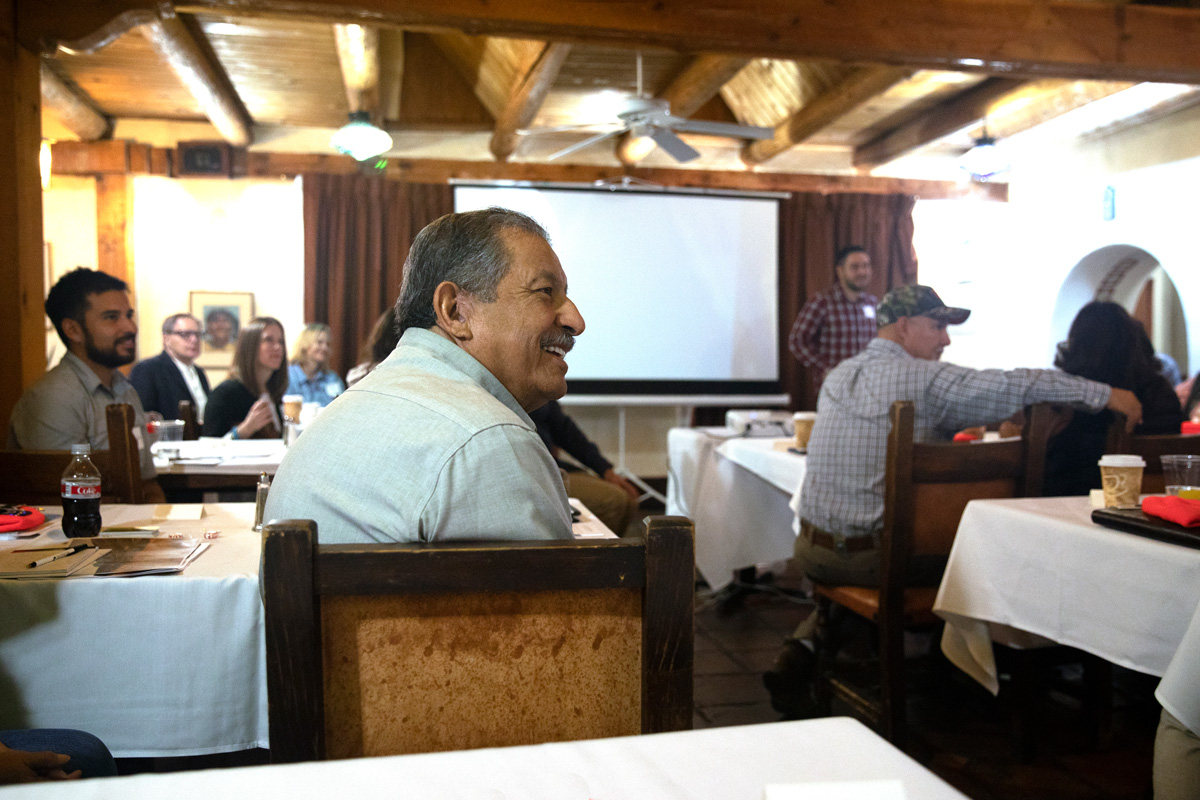
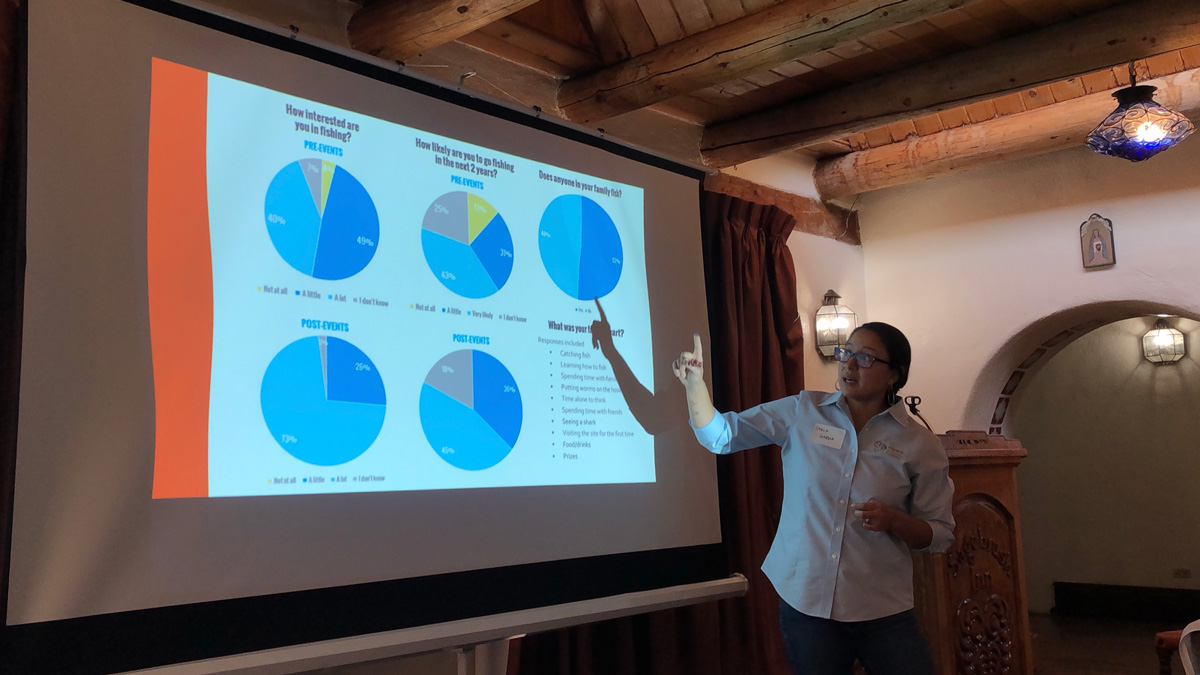
The final morning of the Hispanic Sportsmen and Women’s Summit was spent flyfishing on the Rio Grande River, where some of the luckier (or more skilled) anglers in the group caught some brown and Rio Grande cutthroat trout.
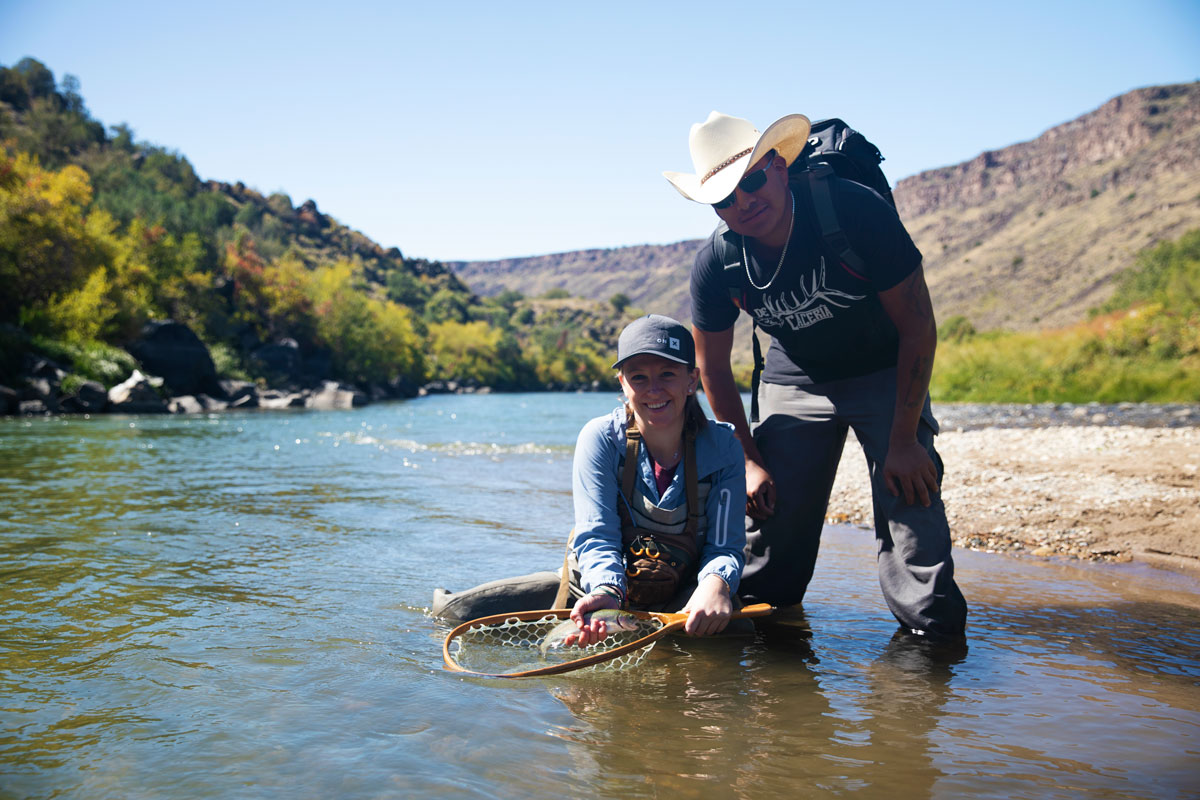
Special thanks to Hispanic Access Foundation, Nuestra Tierra Conservation Project, New Mexico Wildlife Federation, Trout Unlimited, Backcountry Hunters & Anglers, National Wildlife Federation, Ducks Unlimited, Bass Pro Shops, De Caceria, Pheasants Forever, Artemis, HECHO, Recreational Boating and Fishing Foundation, New Mexico Game and Fish, Where the River Runs, and Colorado Parks and Wildlife for their attendance and commitment to increasing Hispanic and Latino voices in our sport.
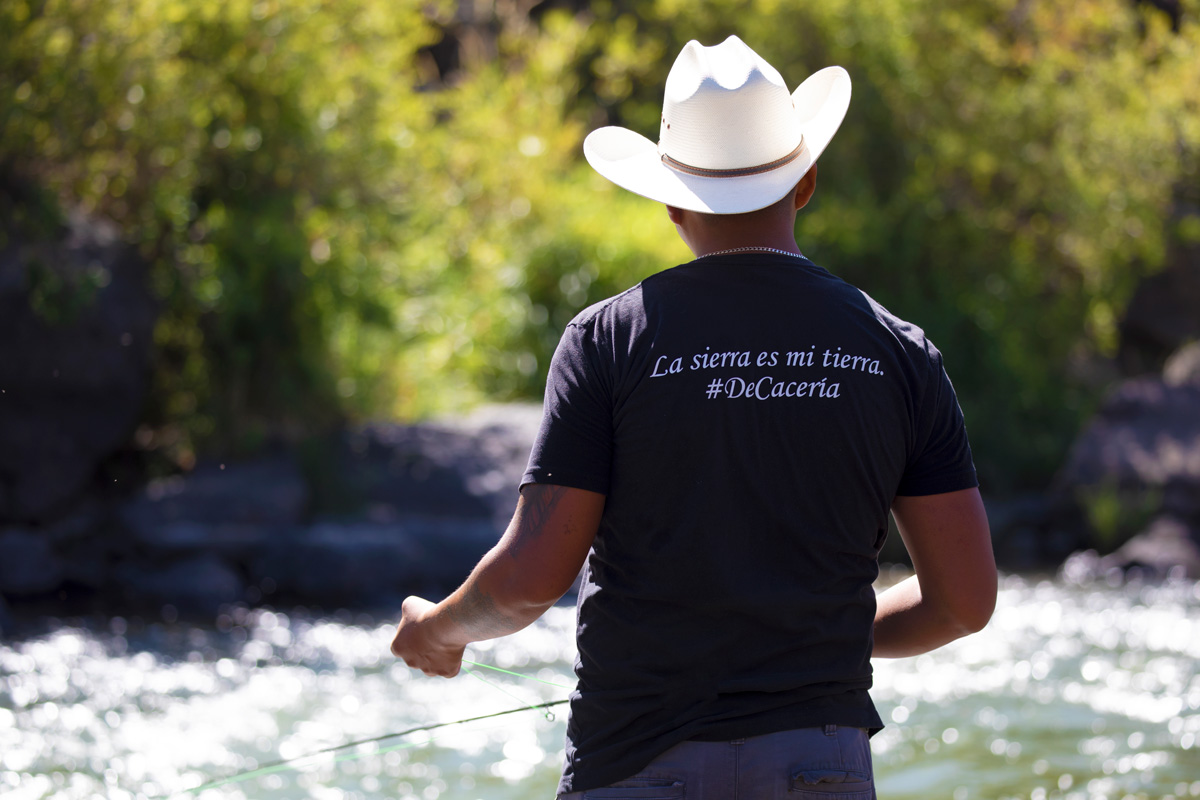
This summit is only the start of an ongoing and critical conversation. Learn more about what the overall decline in hunting participation could mean for conservation funding in America.
The coalition-builder’s president and CEO offers solutions that require federal investment in state efforts
Today, the president and CEO of the Theodore Roosevelt Conservation Partnership testified in front of the House Natural Resources Committee on ways that Congress can invest in efforts to study, test for, and slow the spread of chronic wasting disease in wild deer and elk herds. CWD is a highly contagious, fatal neurological disease that affects deer, elk, and moose.
Whit Fosburgh offered solutions, including securing bipartisan and bicameral support for the investments in research and testing that have been proposed in two House appropriations bills.
“CWD is one of the greatest threats facing the future of hunting in America,” said Fosburgh. “To its credit, Congress seems to recognize the risk that CWD poses to hunting, agriculture, and even human health—and this subcommittee has certainly stepped up. I encourage you to continue to advocate for the funding levels set in the final version of both the House Interior-Environment and House Agriculture Appropriations bills, because surveillance and testing are key to controlling CWD. By knowing where it is, states can take the management actions necessary to contain the disease.”
CWD deteriorates the animal’s brain over time, resulting in emaciation, abnormal behavior, loss of bodily functions, and death. It was first identified in 1967 and remained isolated to a core region between Colorado and Wyoming for decades. But starting in the early 2000s, CWD began to spread rapidly—positive cases have now been confirmed in 26 U.S. states and four Canadian provinces, and wildlife managers are tasked with responding to the epidemic with limited resources.
Deer hunters make up 80 percent of the American hunting public, contribute nearly $40 billion to the U.S. economy, and support wildlife conservation efforts through their purchases of licenses and gear. Currently, testing for the disease is costly and time consuming, and the presence of CWD-positive deer already has some hunters questioning whether their venison is safe to eat. This could mean greater declines in hunting participation and less funding for states that already depend on hunting license and equipment sales for their conservation budgets.
“According to the USFWS, participation in hunting has been declining from about 13 million to 11 million people in the last decade,” Fosburgh testified. “One bright spot in those numbers, has been the growth of the field-to-table movement, or those who hunt to provide lean, organic, locally sourced protein to their family and friends. If people become wary of eating deer and elk, this area of growth in participation could fall away entirely. And conservation will be the biggest loser.”
In June 2019, the House approved a spending bill for federal agriculture, interior, and environmental agencies (H.R. 3305) with amendments that would send $15 million to the states to combat the spread of chronic wasting disease in wild deer and direct $1.72 million to the U.S. Fish and Wildlife Service to enhance CWD research and testing methods.
The TRCP has asked sportsmen and women to urge lawmakers to invest in better research and testing for CWD through the annual appropriations process. Learn more about CWD and the hunter’s role in combatting the spread of this disease.
This House subcommittee hearing marks the fourth time this year that the TRCP has represented the interests of American sportsmen and women by delivering official testimony before Congress. View details on our previous testimony related to improving access to public lands, the five priority pieces of legislation that would invest in fish and wildlife habitat, and how to create drought solutions while enhancing conditions for fish in the Colorado River Basin.
The draft Alaska Roadless Rule undermines collaboration and creates long-term uncertainty
The U.S. Forest Service today released a proposal that would eliminate conservation safeguards for 9.2 million acres of roadless public lands in Alaska.
The agency issued the proposed rule for the Tongass National Forest after the president instructed the Secretary of Agriculture to roll back an 18-year-old limitation on timber harvest and road building within certain backcountry areas of the iconic forest.
“For years, sportsmen and women have been calling for a lasting solution for Alaska roadless areas that would conserve valuable fish and wildlife habitat and provide certainty for local communities that depend on the balanced use of these public resources,” says Whit Fosburgh, president and CEO of the Theodore Roosevelt Conservation Partnership. “Yet because of direct intervention from the White House, we are facing conservation setbacks within the Tongass that will affect more than half of the world’s largest temperate rainforest.”
Roadless areas within the Tongass National Forest, which have long been managed under the direction of the 2001 Roadless Area Conservation Rule, provide vital habitat for salmon and Sitka blacktail deer. They also provide outstanding opportunities for hunting and fishing that support a strong tourism economy and are important for subsistence.
In January 2018, the state of Alaska petitioned the U.S. Department of Agriculture to allow for the development of a state-specific roadless rule. Many hunting and fishing groups and businesses demonstrated a willingness to collaborate and support such a rule if a durable, good-faith compromise could be reached. One such solution was within the range of proposed options recommended by the Citizens Advisory Committee chartered by Governor Walker and is the path supported by a strong majority of Alaskans.
Yet the possibility of a broadly supported, long-term solution that is good for Alaska was all but eliminated this past summer when the White House intervened after an off-the-record meeting with Governor Dunleavy, and the U.S. Department of Agriculture and U.S. Forest Service were directed to propose the most extreme option.
“If implemented, today’s proposal would lead only to more conflict over the future of these lands, harming local communities and everyone’s interests over the long haul,” says Fosburgh. “We encourage the administration to right this ship, and we ask for leadership from the Alaska congressional delegation to shape a long-lasting outcome for the Tongass that brings people together.”
Last fall, the TRCP asked sportsmen and women to urge the Forest Service to support safeguards for Alaska roadless areas. In March 2019, the TRCP also warned against weakening conservation in roadless areas in Utah.
His legacy lives on in the form of 230 million acres of public land set aside for Americans to enjoy and countless species saved by the conservation model he helped to spearhead. It only takes a few minutes to honor Theodore Roosevelt by calling on your own community to give back to conservation.
Here’s how to do it.

2. Tell your friends why you need their help.
$161 total, in honor of T.R.’s 161st birthday
$230 total, in honor of the 230 million acres of public land T.R. helped to set aside for Americans
$260 total, by getting ten friends to donate $26 each in honor of our 26th president
$500 total, because everyone likes a nice round number
$1027 total, in honor of T.R.’s October 27th birthdate
$1858 total, in honor of the year T.R. was born
Title: Help Me Support Conservation in Honor of Theodore Roosevelt’s Birthday
Description: October 27 would have been Theodore Roosevelt’s 116th birthday, which is why I’m asking my friends to consider donating whatever they can to carry on this incredible sportsman’s conservation legacy. Whatever I raise will go to support the Theodore Roosevelt Conservation Partnership in their efforts to guarantee all Americans quality places to hunt and fish. I’ve always admired T.R. for his [tell your personal story here] and I have gained so much from my experiences in the outdoors that wouldn’t have been possible without healthy wildlife habitat, clean water, and access close to home. I hope you’ll help me give something
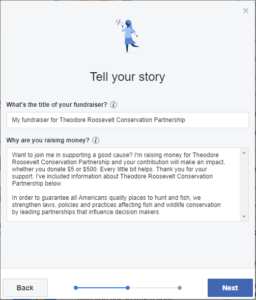
3. Next, set a cover photo.
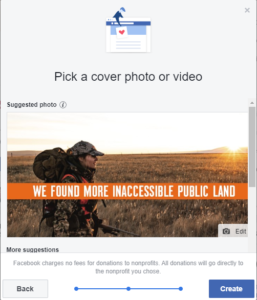
![]()

2. Tell your friends why you need their help.
Title: Help Me Support Conservation in Honor of Theodore Roosevelt’s Birthday
Description: October 27 would have been Theodore Roosevelt’s 116th birthday, which is why I’m asking my friends to consider donating whatever they can to carry on this incredible sportsman’s conservation legacy. Whatever I raise will go to support the Theodore Roosevelt Conservation Partnership in their efforts to guarantee all Americans quality places to hunt and fish. I’ve always admired T.R. for his [tell your personal story here] and I have gained so much from my experiences in the outdoors that wouldn’t have been possible without healthy wildlife habitat, clean water, and access close to home. I hope you’ll help me give something back.
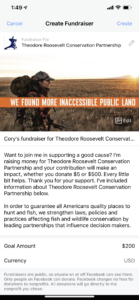
3. Next, set a cover photo and fundraising goal.
$161 total, in honor of T.R.’s 161st birthday
$230 total, in honor of the 230 million acres of public land T.R. helped to set aside for Americans
$260 total, by getting ten friends to donate $26 each in honor of our 26th president
$500 total, because everyone likes a nice round number
$1027 total, in honor of T.R.’s October 27th birthdate
If you need help setting up your fundraiser, please contact Cory Deal at cdeal@trcp.org or 202.639.8727 x18.
TRCP has partnered with Afuera Coffee Co. to further our commitment to conservation. $4 from each bag is donated to the TRCP, to help continue our efforts of safeguarding critical habitats, productive hunting grounds, and favorite fishing holes for future generations.
Learn More
Sign up below to help us guarantee all Americans quality places to hunt and fish. Become a TRCP member today.

For every $1 million invested in conservation efforts 17.4 jobs are created. As Congress drafts infrastructure legislation, let's urge lawmakers to put Americans back to work by building more resilient communities, restoring habitat, and sustainably managing our water resources.